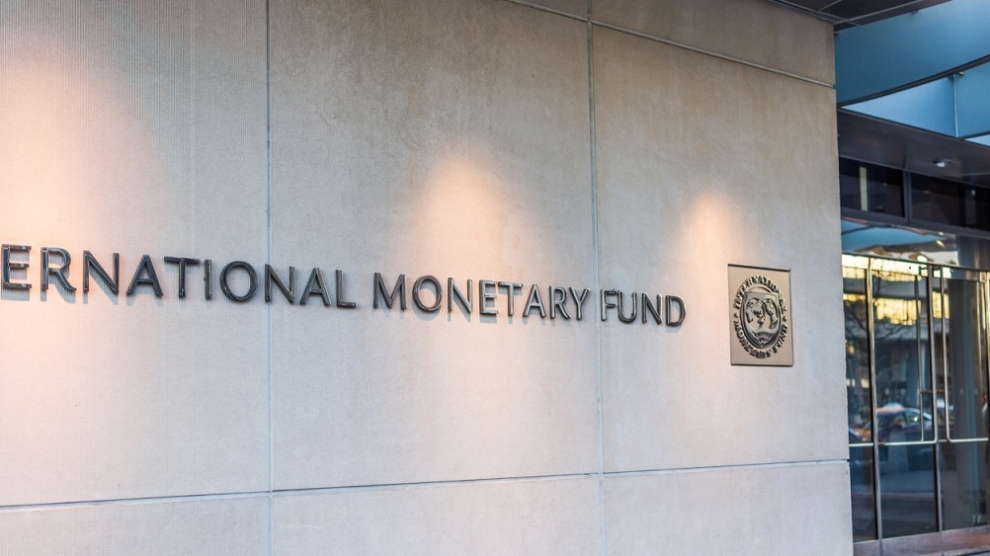The International Monetary Fund (IMF) has approved an 18-month Stand-by Arrangement for Ukraine worth five billion US dollars.
The approval means Ukraine can receive an immediate disbursement of about 2.1 billion US dollars, with the remaining amount disbursed in phases over four reviews during the 18-month period.
“The IMF has proven itself to be a reliable partner to a friend in need,” said Ukraine’s president, Volodymyr Zelensky.
The money is intended to help Ukraine cope with Covid-19 pandemic challenges by providing balance of payments and budget support, safeguarding the reform process and ensuring that Ukraine is well-poised to return to growth when the crisis ends.
Mr Zelensky has long seen the agreement as a vote of confidence in his ability to deliver reforms.
“The new Stand-By Arrangement will provide an anchor for the authorities’ efforts to address the impact of the crisis, while ensuring macroeconomic stability and safeguarding achievements to date,” said Kristalina Georgieva, the IMF’s managing director. “Together with support from the World Bank and the European Union, it will help address large financing needs. The programme will focus on safeguarding medium-term fiscal sustainability, preserving central bank independence and the flexible exchange rate, and enhancing financial stability while recovering the costs from bank resolutions. Concerted reform efforts aimed at tackling corruption and strengthening governance will be critical to ensure macroeconomic stability and achieve sustainable and inclusive growth. At present, the humanitarian and economic crisis stemming from the Covid-19 pandemic has refocused policy priorities away from deep structural reforms.”
In a statement, the IMF said that Ukraine’s track record in stabilising the economy over the last five years has been strong, but warned that more reforms are needed. The outbreak of the Covid-19 pandemic has significantly worsened the outlook and has refocused government policies on containment and stabilisation. Uncertainty is large, and the economy is projected to contract sharply in 2020 as strict containment measures — in Ukraine and globally – have led to sizable falls in domestic and external demand.
The 2020 budget is expected to be hit hard, with a sharp decline in revenues and large emergency spending needs to address the crisis. This has created large balance-of-payments and fiscal financing needs. The World Bank expects the Ukrainian economy to contract by at least 3.5 per cent in 2020.
The new arrangement with the IMF succeeds the 14-month Stand-by Arrangement approved in December 2018, which was focused on maintaining stability during an election year. Policies under the new arrangement will focus on four priorities: mitigating the economic impact of the crisis, including by supporting households and businesses; ensuring continued central bank independence and a flexible exchange rate; safeguarding financial stability while recovering the costs from bank resolutions; and moving forward with key governance and anti-corruption measures to preserve and deepen recent gains.
“The risks to the new programme are very large,” added Dr Georgieva. “The uncertainty about the severity and length of the global downturn is exceptionally high. On the domestic side, uncertainty about the direction of economic policies remains substantial, while public debt remains high and government financing needs are large. While fiscal policies under the programme will initially be directed at addressing the impact of the crisis, fiscal policy will need to be tightened as the recovery sets in, to place public debt back on a downward path.”
While Dr Georgieva pointed out that the National Bank of Ukraine has “skillfully” managed monetary policy during a very challenging period, she warned that central bank independence should be preserved, and monetary and exchange rate policies should continue to provide a stable anchor in the context of the inflation-targeting regime, while allowing orderly exchange rate adjustment and preventing liquidity stress. Financial policies should strike a balance between preserving financial stability and assisting the recovery.
“Full and timely implementation of policies under the Fund-supported programme will be critical to mitigate economic risks and lay the ground for stabilisation and recovery,” she said.
—
Unlike many news and information platforms, Emerging Europe is free to read, and always will be. There is no paywall here. We are independent, not affiliated with nor representing any political party or business organisation. We want the very best for emerging Europe, nothing more, nothing less. Your support will help us continue to spread the word about this amazing region.
You can contribute here. Thank you.




